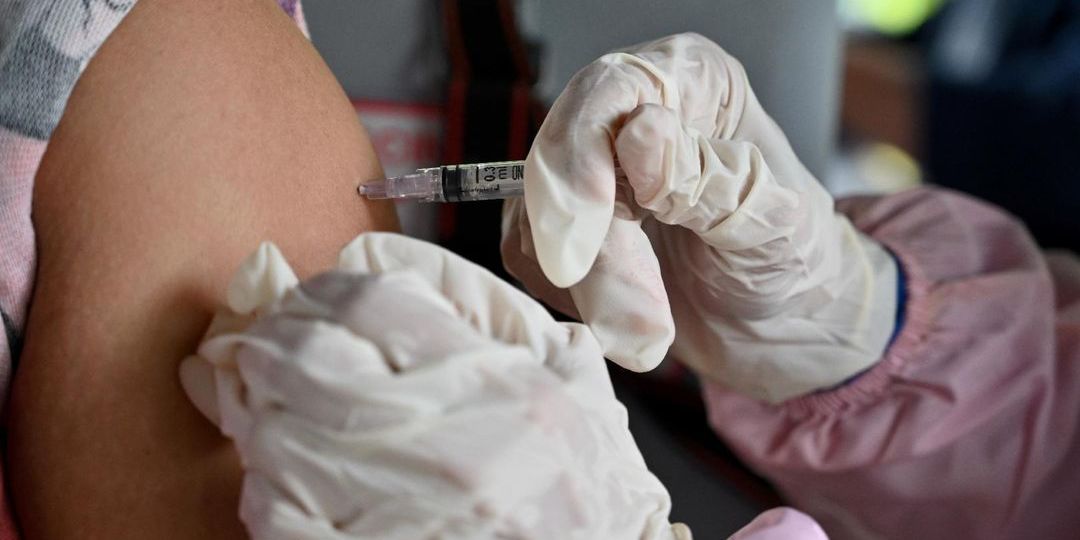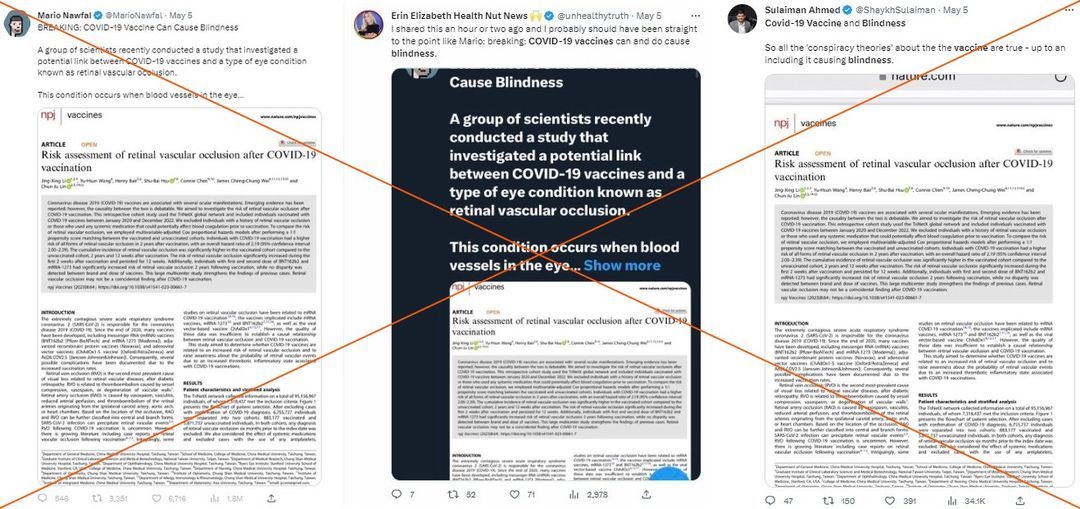
Social media posts warn against coronavirus vaccines, claiming research shows they cause blindness. But the study cited online did not establish vaccination as the cause of a rare retina condition, and ophthalmology experts say the risk of vision impairment is greater following Covid-19 infection.
“BREAKING: COVID-19 Vaccine Can Cause Blindness,” says the title of a May 5, 2023 tweet.
The full post says: “The paper still recommends people to be vaccinated, referencing the 14.4 million excess deaths prevented by the vaccine and ‘the lack of definite causation between retinal vascular occlusion and vaccinations.'”
However, articles and social media posts repeating the claim focus solely on the purported risk of vision loss.
“I probably should have been straight to the point like Mario: breaking: COVID-19 vaccines can and do cause blindness,” tweeted Erin Elizabeth, an alternative health blogger identified by the Center for Countering Digital Hate as one of the top spreaders of anti-vaccine content.
Another tweet from an account with more than 63,000 followers says: “So all the ‘conspiracy theories’ about the the (sic) vaccine are true.”

Similar claims also circulated elsewhere on Twitter, Facebook and Instagram, all referencing a study (archived here) titled: “Risk assessment of retinal vascular occlusion after Covid-19 vaccination.”
The paper was published May 2, 2023 in the peer-reviewed, open-access journal npj Vaccines. Researchers analyzed vaccinated and unvaccinated patient data from 52 US health care organizations to see if the Covid-19 shots were associated with retinal vascular occlusion (RVO), a condition where blood clots block the retinal vein, causing blurry vision or sudden, permanent blindness.
RVO is the second most common cause of retinal vascular disease and often occurs in older patients. Those with hypertension and diabetes are also at higher risk of RVO.
The posts focus on the study’s finding that vaccinated patients “had significantly increased risk of retinal vascular occlusion two years following vaccination.” But the claims omit the fact that the study says “limited evidence and low frequency of the disease has complicated the establishment of a definitive association between both.”
The number of people in the study who suffered RVO was “extremely small,” according to Phil Hooper, president of the Canadian Ophthalmological Society — accounting for less than one percent of the study population.
The paper authors recommend vaccination “to protect against Covid-19, owing to the lack of definite causation between retinal vascular occlusion and vaccinations.”
Hooper said in a May 16 email that the study is no reason to skip the vaccine, particularly because “the population at greatest risk for a poor outcome following Covid (the elderly and those with underlying illness, diabetes or cardiovascular disease) is the population at higher risk of developing retinal vascular events in general.”
The American Academy of Ophthalmology has alerted practitioners to certain vaccine-related ocular reactions, but the group says “adverse event reporting systems show that vaccination-associated retinal conditions are exceedingly rare, making it difficult to ascertain the causative nature of Covid-19 vaccination.”
More risk from infections
The social media posts also mislead by omitting the risk of RVO following Covid-19 infection, according to Rishi Singh, president of Cleveland Clinic Martin North and South hospitals.
There is “an increased risk of retinal vein occlusion in the six months after infection,” according to a 2022 study (archived here).
Singh is the senior author of a paper (archived here) published April 13 in JAMA Ophthalmology. Similar to the study in Nature, it examined health records from three million patients and found “no evidence suggesting an association between the mRNA Covid-19 vaccination and newly diagnosed RVO.”
Singh told AFP on May 15 the findings should be “reassuring to the population” because studies looking at two different databases failed to show the vaccine causes the retina condition.
He said the risk of an eye injury is “quite low” — his team’s study found 0.003 percent of patients had a new diagnosis of RVO within 21 days. He added that rare cases of RVO can be treated.
“What I always tell people is that when you have a systemic disease versus a local eye disease, that systemic disease always wins out over local eye concerns because we can take care of most everything else,” Singh said.
A 2022 study (archived here) that examined reports of eye conditions following Covid-19 vaccination also concluded the “benefits of Covid-19 vaccination both at an individual and a population level far outweigh the risks of ocular complications.”
More of AFP’s reporting on vaccine misinformation is available here.
